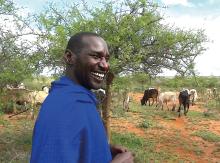Land Library Search
Through our robust search engine, you can search for any item of the over 73,000 highly curated resources in the Land Library.
If you would like to find an overview of what is possible, feel free to peruse the Search Guide.
/ library resources
Showing items 1 through 9 of 21.The year 2016 marks 15 years since the new wave land reforms became operational in Tanzania. Despite its ambitious goals – encouraging land registration and titling, and empowering women and other vulnerable groups – the results are disillusioning.
It would be difficult to imagine the diet of the local consumers around Lake Victoria without the silver cyprinid. The small fresh water sardine also plays an important role in women’s participation in Kenya’s fishery sector.
During the last few years, the donor community has increased its efforts to reduce the large amounts of fish lost in the distribution chain in artisanal fishery, an endeavour that ought to be welcomed in principle.
Experts agree that the rising demand for fish for human consumption cannot be met without a major expansion and sustainable intensification of aquaculture. Our WorldFish authors describe the areas in which research plays a particularly important role in this context.
Meant well doesn’t always mean done well. The Sustainable Development Goals are all set to undermine themselves, Stephan Klasen maintains.
Despite the crucial role of women in family farms and small-scale agriculture, gender inequality is still present in many ways – jeopardising the food and nutrition security of millions of people.
Family farms are often associated with greater sustainability. But the definition of sustainability is a highly disputable topic.
Providing extension and advisory services is expensive. There are salaries to be paid, transportation and operational funds to be provided, buildings to be rented or built, demonstration plots to maintain, and continued education to be offered to the extension staff.
In many parts of Africa, formal education and training in agriculture is almost nonexistent. Swiss Biovision Foundation supports farmers via its Farmer Communication Programme.








